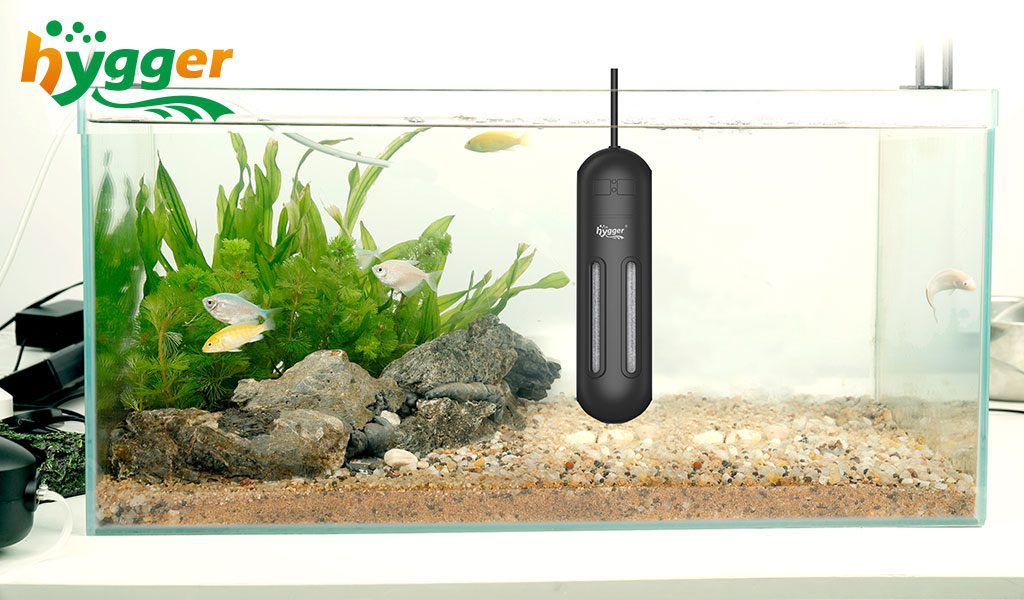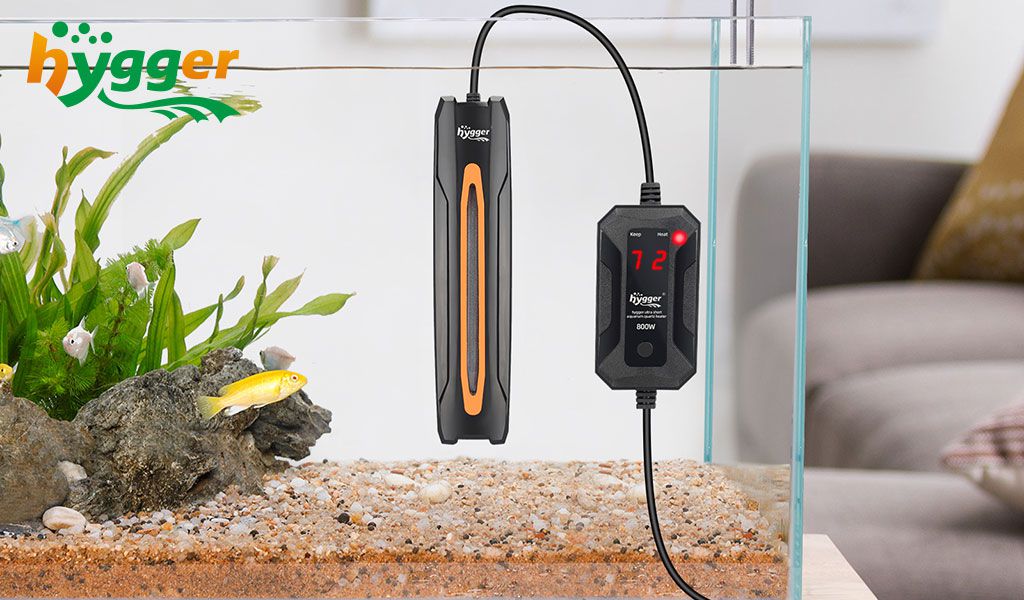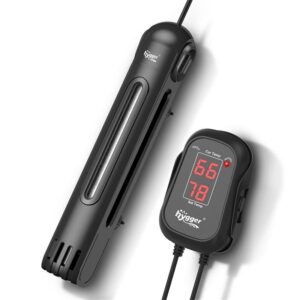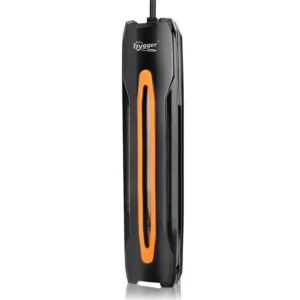Most tropical fish need an aquarium heater to maintain a warm and optimal water temperature in fish tanks. Please read on for more insight on how to choose the water heater wattage for an aquarium and what temperature should a fish tank be. Without further ado, let’s dive in.
Content Table
Aquarium heater wattage per gallon
Aquarium heaters made of impact-resistant glass and sealed with a waterproof seal should be your first choice. But how to determine the wattage of the aquarium heater? In general, you should know your fish tank size. The larger the tank, the more water needs to be heated, hence, the higher the heater wattage. Just follow “5 watts per gallon of aquarium water”. For example, if you have a 60 gallon fish tank, a 300 watts aquarium heater is better.
Besides that, test the room temperature in advance before determining the aquarium heater’s wattage. Because the heater wattage can be determined by the temperature differences between room temp and tank temp. Take a 5 gallon fish tank as an example, if the room temp is five degrees lower than the tank temp, then a 25W aquarium heater may be necessary.
The table below gives you a reference for the recommended water heater wattage for diverse tank sizes and the temperature differences.
| The temperature difference between room temp and tank temp | 5℃ /9℉ | 10℃ /18℉ | 15℃ /27℉ |
| 5 gallon /25 L | 25 watts | 50 watts | 75 watts |
| 10 gallon /50 L | 50 watts | 75 watts | 75 watts |
| 20 gallon /75 L | 50 watts | 75 watts | 150 watts |
| 25 gallon /100 L | 75 watts | 100 watts | 200 watts |
| 40 gallon /150 L | 100 watts | 150 watts | 300 watts |
| 50 gallon /200 L | 150 watts | 200 watts | 400 watts |
| 65 gallon /250 L | 200 watts | 250 watts | 500 watts |
| 75 gallon /300 L | 250 watts | 300 watts | 600 watts |
What wattage heater for 100 gallon tank
Commonly, what wattage heater for the 100-gallon tank? Just follow the rule – 5 watts per gallon of aquarium water. Accordingly, a 100-gallon tank should be matched with a 500W aquarium heater. Next, we will show you more examples.
| Tank size | Recommended aquarium heater |
| 120 gallon | 500W or 800W fish tank heater |
| 150 gallon | 800W smart aquarium heater |
| 180 gallon | 800W or 1000W intelligent quartz heater |
| 220 gallon | 800W or 1200W double quartz heater |
| 260 gallon | 1000W submersible double quartz heater |

What temperature should a fish tank be
What temperature should a fish tank depend on the aquatic pets in the tank? The following are references.
| Tank types | Ideal water temperature |
| Tanks with tropical fish | 75 – 80℉ |
| Tanks with cold water fish | 60 – 75℉ |
| Freshwater aquariums | 72 – 82℉ |
| Saltwater aquariums | 78 – 82℉ |
| Tanks with aquatic plants | 72 – 82℉ |
Usually, it is not a good option to keep aquatic pets or plants demanding different water temperatures. For instance, most tetras should be kept in a water temperature of 75-80℉, while goldfish prefer a temperature ranging from 68℉ to 74℉. Consequently, tetras and goldfish can not be kept in the same tank.
On the other side, if you want to keep different fish species that need similar water temp in one tank, how to set the water temperature? Take tetras and guppy fish as an example. Tetras like to live in water temp of 75-80℉. And the guppy fish fancy a water temp of 74-82℉. Then the water temp of tanks with tetras and guppy fish can be set between 75-80℉. In a word, just take the common values of the water temp.
Will the fish tank heater remove oxygen from the water
However, in summer, adding a fish tank heater may also be necessary. However, will the heater remove oxygen from the water? Exactly, excess heat will decrease the dissolved oxygen level in the tank. And it is damaging to fish. Generally, the hotter the water, the lower the oxygen level in the tank.
But if you can not remove the aquarium heater, what can you do to maintain the optimal oxygen level in the tank? The definitive answer is improving surface agitation. You can do water changes. Pour new water from a certain height. Aside from that, adding an aquarium air pump is an excellent alternative. As one piece of aquarium equipment, an air pump can create water movement, which enables aeration by mixing the water on the surface and the rest. It helps to improve oxygen levels in the tank and keep good water quality by circulating and filtering the water.
An AC adjustable air pump is a great option. Featuring ultra-quiet with dual outlets, it can be applied to 5-600 gallon tanks, including freshwater and marine aquariums. The pump can be used in deep tanks up to 8 feet, and withstand long-time use to promote oxygen supplement constantly. It is powerful enough to power the long decorative air stones, multiple air stones in one or more tanks, and protein skimmers for saltwater aquariums, etc.

To be continue
In short, aquarium heaters are a piece of crucial aquarium equipment, which brings a handful of benefits. In the case of aquarium heater wattage selection, you should consider three aspects – tank size, the temperature differences between room temp and tank temp, and the temperature requirements of aquatic pets or plants in the tank.
Additionally, the Aquarium Heating Basics Part One gives you the use and types of aquarium heaters. And you can learn about condensation in the aquarium heater. If you want to learn more truth about aquarium heating, just stay tuned to the hygger blog. Also, if you have more additional ideas about aquarium heating, welcome to leave messages in the comment. We are happy to receive your sharing. Finally, thanks for taking the time, and we hope this article helps.


Very informative post!
It’s so important to remember that the health of our aquatic pets heavily depends on maintaining the appropriate temperature in their environment.
This guide is a great starting point for anyone new to maintaining an aquarium.
Also, I appreciate the mention of the heater’s potential effect on oxygen levels – it’s a detail often overlooked but crucial for the health of the fish.
Looking forward to reading more about aquarium heating in your upcoming posts!